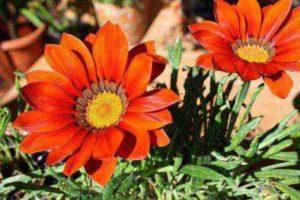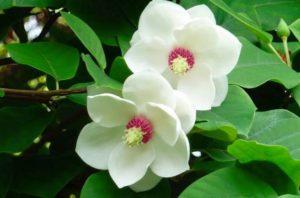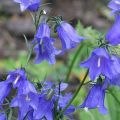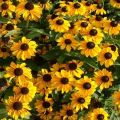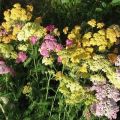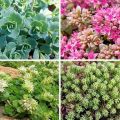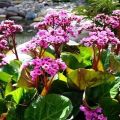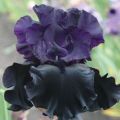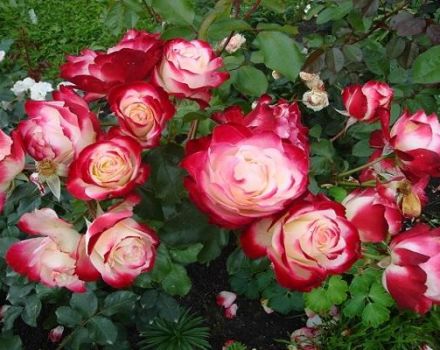Description of 25 species and varieties of armeria, planting and care in the open field
Armeria is a flowering herbaceous perennial. Outwardly, the plant looks like a carnation, but forms smaller flowers. It is not difficult to grow an army on your site, it is important to follow the basic rules of planting and caring for a seaside beauty. This amazing flower has good frost resistance. Armeria is a great addition to the alpine slides, presented in various colors: from white and pink to bright red shades.
Description and features
Armeria is a representative of the Pig family. The place of natural growth is the coast of North America. Short description:
- The bush forms grassy thickets.
- Plant height from 20 to 60 centimeters.
- The root system is pivotal.
- Erect smooth stem.
- Flowers are small, collected in spherical inflorescences.
- The flowering period is from May to September.
- The plant is light-loving, frost-resistant, drought-resistant.
The genus of Armeria includes more than 90 species. The seaside beauty is a metallophyte, that is, it can grow on soils with a high degree of pollution with heavy toxic metals: lead, zinc and many others. Armeria cleans the soil by recycling harmful compounds.
Growing seedlings
The seaside beauty is bred in several ways:
- seedling;
- sowing seeds directly into the ground;
- dividing the bush.
A convenient way to propagate armeria is to grow seedlings from seeds. Sowing in seedling boxes begins in mid-February. The procedure begins with the preparation of seeds, which are soaked for several hours in warm water and disinfected with a solution of potassium permanganate.
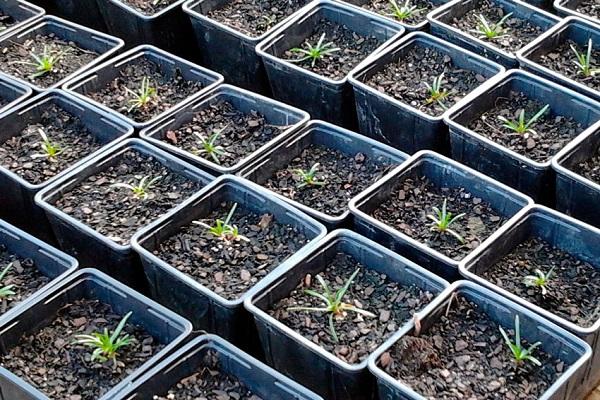
Timing
Mid-February or early March is the optimal time for sowing seeds in seedling boxes, after 7-10 days the first shoots appear, which begin to grow rapidly, by the beginning of April the seedlings are ready for planting in open ground.
Soil preparation
Armeria prefers nutritious, non-alkaline, loose soils. Before sowing seeds, the soil in seedling boxes is disinfected with boiling water or a solution of potassium permanganate. For growing seedlings, peat soil mixed with sand is used.
How to plant
It is not necessary to pick young bushes, so sowing can be done in individual containers right away. If a seedling box is used, then the distance between the shoots is left at 3-4 centimeters. The seeds are sprinkled with earth to a depth of 1.5-2 centimeters and watered abundantly. Seedling containers are covered with foil until shoots appear and placed on a warm windowsill.
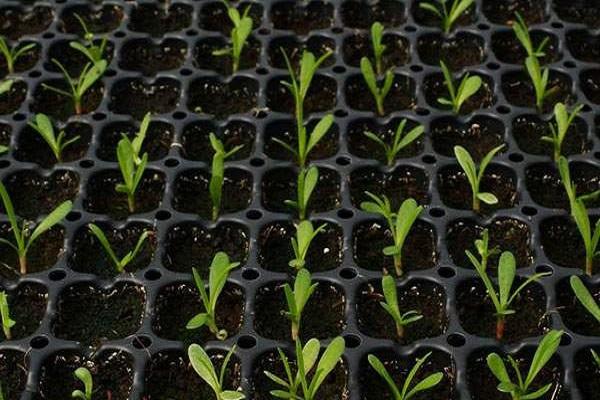
Temperature and light conditions
Armeria is a light-loving plant; regular lighting is necessary for seed germination. Optimum soil temperature +20 C. When growing seedlings in partial shade, the sprouts are strongly elongated, the plant forms a fragile stem and a weak root system.
Landing in open ground
Fortified and hardened seedlings are planted in open ground in early May. Beforehand, a place is chosen for young bushes and the soil is prepared.
When to plant
In the spring, as soon as the soil warmed up to +10 With and the threat of frost has passed, the army is planted in a permanent place. In areas with a temperate climate, for several days after planting, the plants are protected from possible frost by additional shelters.
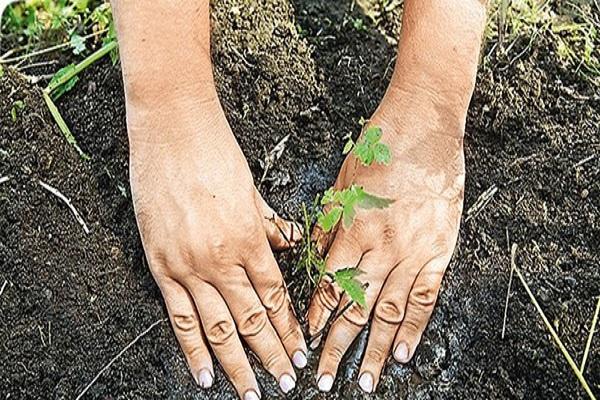
Seat selection
A herbaceous shrub is picky about light, you need to choose a sunny place for planting it. The flower grows well on slopes and small hills.
Important! Avoid stagnant moisture at the roots of armeria, establish drainage. The plant will die on swampy soils.
Soil requirements
Armeria does not tolerate alkaline soils, the plant does not take root well, loses its growth rate and decorative effect. In this case, the lime in the soil is neutralized with vinegar or ammonium nitrate. The best option is slightly acidic soil with the addition of sand and peat.
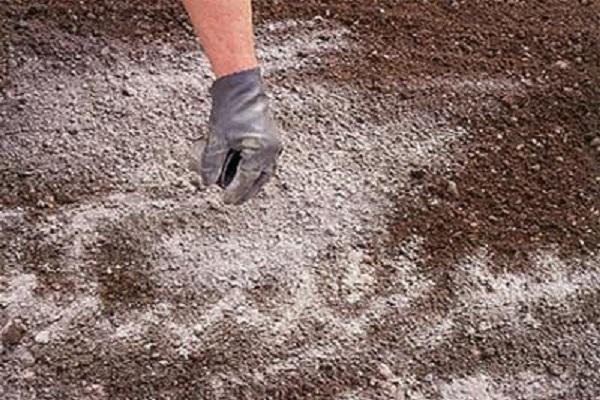
Landing scheme
The seaside beauty forms a rather lush bush, it is recommended to maintain a distance between plants of at least 35 centimeters. To create carpet, the spacing between the bushes is reduced to 20 centimeters.
Care
A herbaceous flowering perennial does not impose difficult requirements for care, is suitable for beginner gardeners, and is successfully grown in city flower beds.
Watering
For armeria, the statement is true: "it is better not to top up than to pour." Plants tolerate drought, and the high humidity causes the shrub to rot and die. Watering armeria should be moderate.
Top dressing
Shrubs are fed three times a season with a complex of universal mineral fertilizers. The plant does not tolerate excess organic matter.
Important! The use of dolomite flour and wood ash as fertilizers is contraindicated.
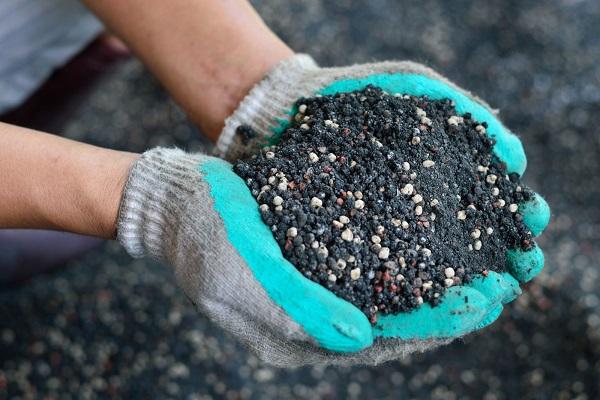
The loosening procedure is often combined with mulching the plantings with a mixture of peat and sand.
Pruning
To give a neat look to the shrub, the armeria is cut off as the faded stems accumulate. With regular preventive pruning of the plant, the flowering period increases noticeably, the shrub looks well-groomed and retains its decorative appeal.
Transfer
In one place, Armeria grows for no more than 5 years, then the bush degenerates, the number of buds decreases markedly. 3-4 years after planting, the plants are rejuvenated and new seedlings are obtained by dividing the bush.
Diseases and pests
Resistant immunity to diseases and pests is the hallmark of this flowering perennial. Armeria can get sick if the rules of care, agricultural technology and when grown on alkaline soils are not followed.
The main ailment that affects a beautiful flower is root rot. They do not allow waterlogging of the soil, more often they loosen the soil. All damaged stems and leaves from the plant are removed with a secateurs. In severe cases, fungicides are used - Bordeaux liquid, "Fitosporin".
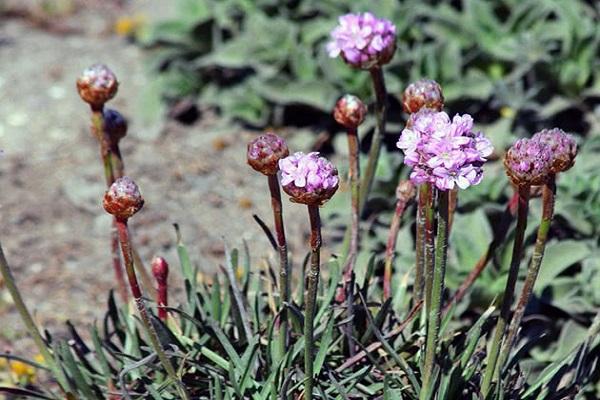
Of the insect pests, aphids should be wary, it destroys the flowers of the armeria. In this case, the bushes are treated with "Aktara" or other insecticides.
Preparing for winter
For winter, Armeria bushes are covered with dry leaves or spruce branches. All faded stems must be removed. Armeria is a frost-resistant plant that tolerates Russian winters well.
Seed collection
You can collect the seeds of armeria in a simple way: a kind of "hat" made of gauze or soft fabric is put on the flower. Once the seeds are ripe, they fall off and remain inside the cap. It is enough for the gardener to untie the device and pour in the seed.
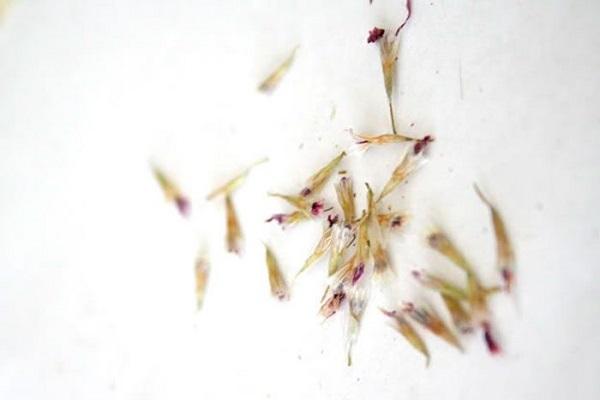
Kinds
There are more than 10 varieties of armeria, which are used in various landscape compositions. The flower looks great in rocky gardens, alpine slides, group and individual plantings.
Alpine
A perennial that forms flowering stems 30 centimeters high. Inflorescences are large, delicate white with a pink tint. Blooms throughout June. Due to the original shape of the leaves, it is highly decorative even without the presence of flowers.
Beautiful
An evergreen perennial that blooms all summer. The height of the plant depends on the variety: from 20 to 60 centimeters. The species has good frost resistance and strong immunity to fungal diseases. Armeria beautiful is often used in individual plantings.
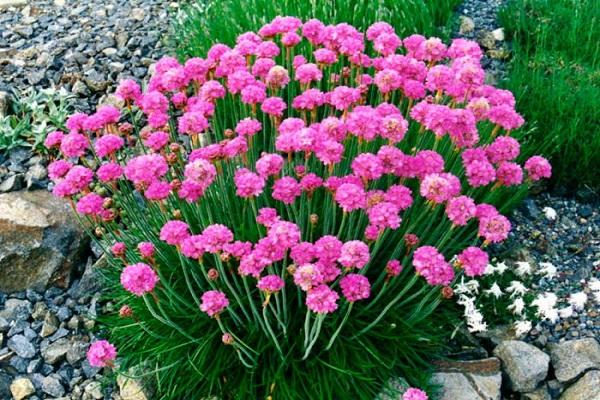
Primorskaya
A magnificent flower blooms from mid-May, it can form decorative thickets. Peduncles are elongated to a height of 30 centimeters, form beautiful spherical inflorescences. Armeria maritima is an unpretentious plant with a high degree of drought tolerance. Bushes look beautiful in individual plantings along the edges of artificial reservoirs and in alpine slides.
Soddy
A low-growing perennial used to create carpets. It begins to bloom from mid-July to late September. With proper care, it forms a large number of flowers, due to which the leaves become invisible.
Juniper
The homeland of this species is Spain and Portugal. Bushes of low growth, completely covered with large spherical flowers. Suitable for creating carpets. The leaves resemble juniper needles.
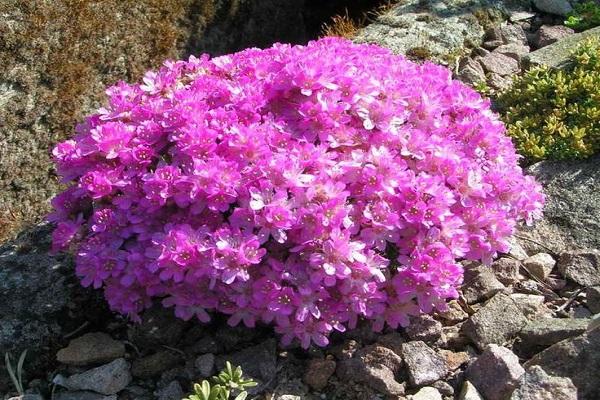
Lovely
An evergreen unpretentious perennial with a grass-like leaf shape. Forms long stems with spherical inflorescences, the diameter of which can reach 7 centimeters. In landscape design, it is used to decorate rocky gardens.
Arctic
Biennial herbaceous flower up to 20 centimeters high. In the second year, the Arctic armeria fades and dies, under natural conditions it can grow for several years. The diameter of the inflorescences is 2 centimeters, during flowering it gains up to 10 peduncles.
Velvich
Tall herbaceous perennial, reaching a height of 50 centimeters. The leaves are pointed, elongated, but wide enough for armeria. Blooms profusely all summer. The diameter of the spherical inflorescences is 2.5 centimeters.
Ordinary
The second name is garden armeria, it can reach a height of 60 centimeters. During the flowering period, it forms up to 40 peduncles. The flower has a fragrant aroma and resistance to cold snaps and temperature extremes.
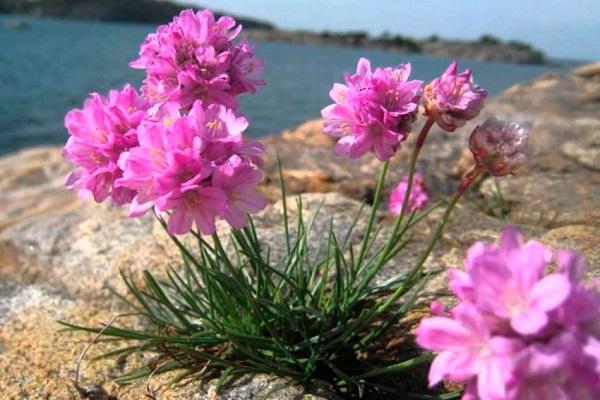
Popular varieties
All varieties of Armeria are represented by different varieties. The choice of a variety depends on the purpose of growing a flower and its application in landscape design.
Red ballerina
Luxurious original flower, decoration of alpine hills and rocky gardens. Spherical inflorescences of bright red color are eye-catching, with the help of armeria of this variety, you can make color accents on flower beds. In group landings, they are perfectly combined with forget-me-nots.
Louisiana
A stunted representative of the Armeria family, used for growing on alpine slides. It begins to bloom in the second year, pleases with flowers all summer. Differs in high winter hardiness, reproduces by self-seeding.
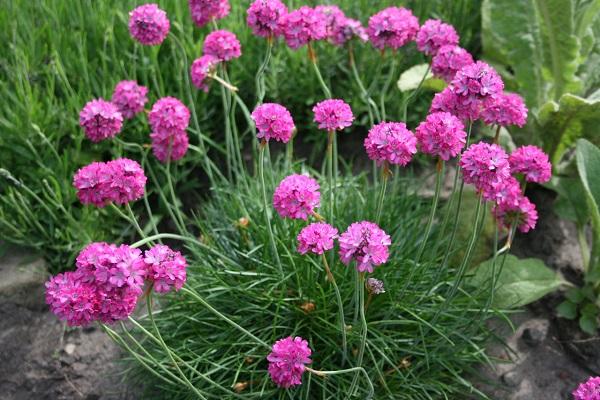
Alba
The variety fascinates with spherical flowers of a delicate pink color, there are snow-white varieties. It begins to bloom from May to mid-August. The height of the flowering stems is 20 centimeters. Can hibernate without additional shelter.
Rosea
Vibrant bold pink flowers are designed to create a color accent in flower beds. The variety is used for individual planting and decoration of city flower beds. The height of the peduncles is 20 centimeters.
Joystick White
The variety of armeria is beautiful, has high decorative qualities, forms snow-white spherical flowers up to 40 centimeters high. Duration of flowering is from June to September.
Thrift
It is considered one of the shortest representatives of the family. Suitable for creating carpets. Does not tolerate excess moisture, it is characterized by increased drought resistance.
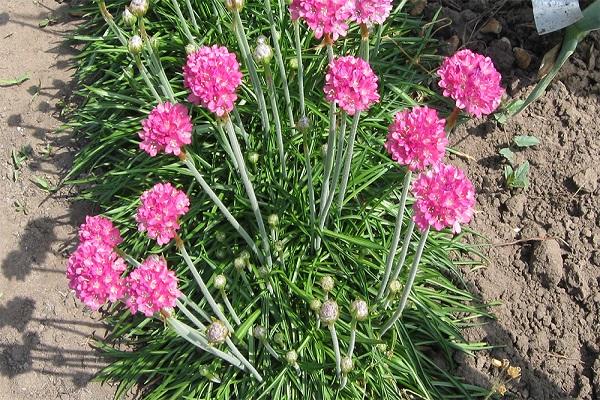
Red Planet
Herbaceous perennial up to 35 centimeters high. Forms medium-sized spherical red flowers with a diameter of 4 centimeters. Suitable for decorating alpine slides and city flower beds. Does not tolerate alkaline soils.
Bees Ruby
Tall perennial with pink flowers. The representative of the armeria species is beautiful. Reaches a height of 30 centimeters. The plant is unpretentious, growing in one place for more than 3 years. Withstands drought and temperature extremes.
Dusseldorf Stolz
A variety of seaside armeria. Cushion-shaped herbaceous low-growing perennial. Blooms from May to early August. Differs in the original color of the inflorescences - a bright raspberry-red color. The height of the peduncles does not exceed 20 centimeters.
Vindictive
A representative of the seaside armeria with delicate scarlet flowers. A low-growing variety with narrow decorative green leaves. Drought-resistant, does not tolerate stagnant moisture at the roots and soil with low acidity.
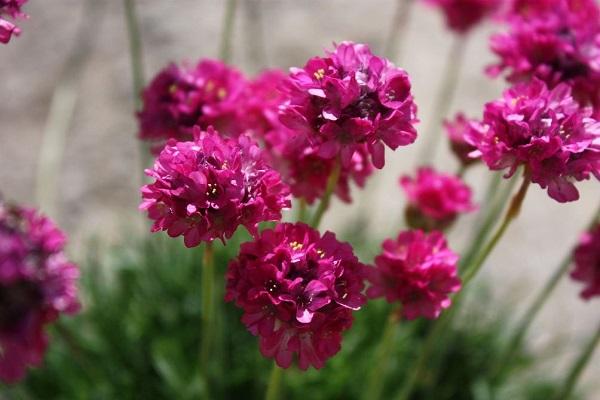
Bloodstone
Herbaceous perennial with burgundy flowers, belongs to the varieties of the seaside armeria. Flowers with a diameter of 4 centimeters are able to completely cover the bush. The plant is planted along the edges of artificial reservoirs and in individual plantings on alpine slides.
Brno
Sod armeria variety. The leaves are shaped like needles, the flower is planted to create carpets. Brno is a ground cover plant. Forms pink flowers, drainage is required.
Beavans Variety
A representative of the juniper-leaved species, it forms dense cushions that cover the soil with a continuous carpet. Ideal for alpine slides and rocky gardens. Bivenz Variety is planted in sunny areas, in the foreground of other plants.
Mar Splendens
Perennial herb with a highly developed taproot. The beginning of flowering is May, the duration of the period is 70-80 days. Splendens forms spherical pink-purple inflorescences. It tolerates cold winters with little snow. In drought, it needs additional watering.
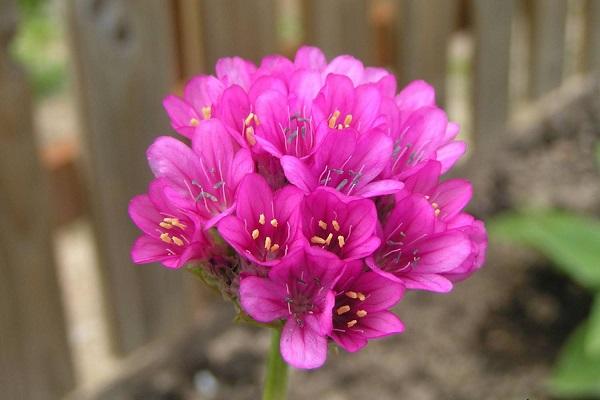
Anna Maria
An elegant representative of the beautiful armeria. The height of an adult plant is 35 centimeters. It begins to bloom in the second year from mid-May. Duration of flowering 70-80 days. It forms spherical inflorescences of pink or white color. In landscape design, they are used as a curb plant.
It is difficult to imagine an alpine slide without armeria. The plant is unpretentious, takes root quickly, has high decorative qualities in terms of both flowers and bush shape. It is not difficult to take care of the plant, it is important to choose the right place for planting and observe the seeding time.
